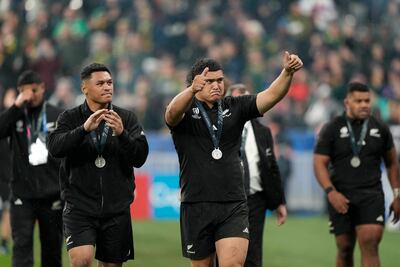New Zealand captain Sam Cane became the first player to be sent off in a Rugby World Cup final as South Africa retained their title with a nail-biting 12-11 victory at Stade de France.
Cane was shown a red card for in the 28th minute for a dangerous tackle on Jesse Kriel but the All Blacks responded with character and resilience to take the champions to the wire on a wet Paris night.
Beauden Barrett ran in the first try ever scored against South Africa in a World Cup final as the final quarter approached but, with Richie Mo’unga unable to add the conversion, New Zealand still trailed.
Jordie Barrett then missed a tricky long-range penalty that would have toppled the Springboks and despite furious late attempts to strike from long range they were unable to break through the green wall.
Handre Pollard kicked four first-half penalties but South Africa failed to score again after the interval of one of the greatest finals that ended with the 80,000 crowd on their feet in nervous anticipation.
The victory means South Africa are the most successful nation in men’s World Cup history with their fourth crown nudging them clear of the All Blacks.
And it came despite one of their worst fears materialising in the third minute when Mbongeni Mbonambi – the only specialist hooker in their match day 23 – was injured by a dangerous clear out by Shannon Frizell.
Mbonambi departed and on came Deon Fourie, a 37-year-old who has played most of his rugby in the back row. Referee Wayne Barnes confirmed shortly after that Mbonambi’s departure was tactical only.

Pollard rifled over successive penalties to reward mounting Springboks pressure but, having been shown a yellow card, Frizell survived the bunker review of his offending crocodile roll.
There was no let up in tension on a night dominated by two ferocious defences and the scoreboard continued to tick over when Mo’unga and Pollard took successful shots at goal.
The World Cup’s most ruthless attack was making little headway against its meanest defence and twice New Zealand were turned over as an error-strewn spell was compounded with an overthrown line-out.
Cane was the next All Black into the sin-bin for his high tackle on Kriel and South Africa continued to win every meaningful moment of the contest.
And it got worse for New Zealand as, just moments before Pollard landed his fourth penalty, Cane’s yellow card was upgraded to red by the bunker.

South Africa came under furious attack in response but with Eben Etzebeth cynically returning to an onside position while interfering with play, they only conceded three points to Mo’unga.
Next into the sin bin was Siya Kolisi for a challenge on Savea that resulted in a clash of heads and the All Blacks appeared to have exploited his absence by scoring through Aaron Smith only for an earlier knock-on to be spotted.
Upon Kolisi’s return they succeeded, however, when Mark Telea ran a mazy line and after he dropped the ball a superb pick up by Barrett allowed the full-back to touch down.
Mo’unga missed the conversion so Zealand trailed by a point and there was no let up in drama as the final quarter ebbed and flowed.
Wing Cheslin Kolbe became the third yellow card but Jordie Barrett was wide with the penalty attempt and, in the face of a determined final attack from the All Blacks, South Africa held out to successfully defend the trophy they won against England four years ago.

